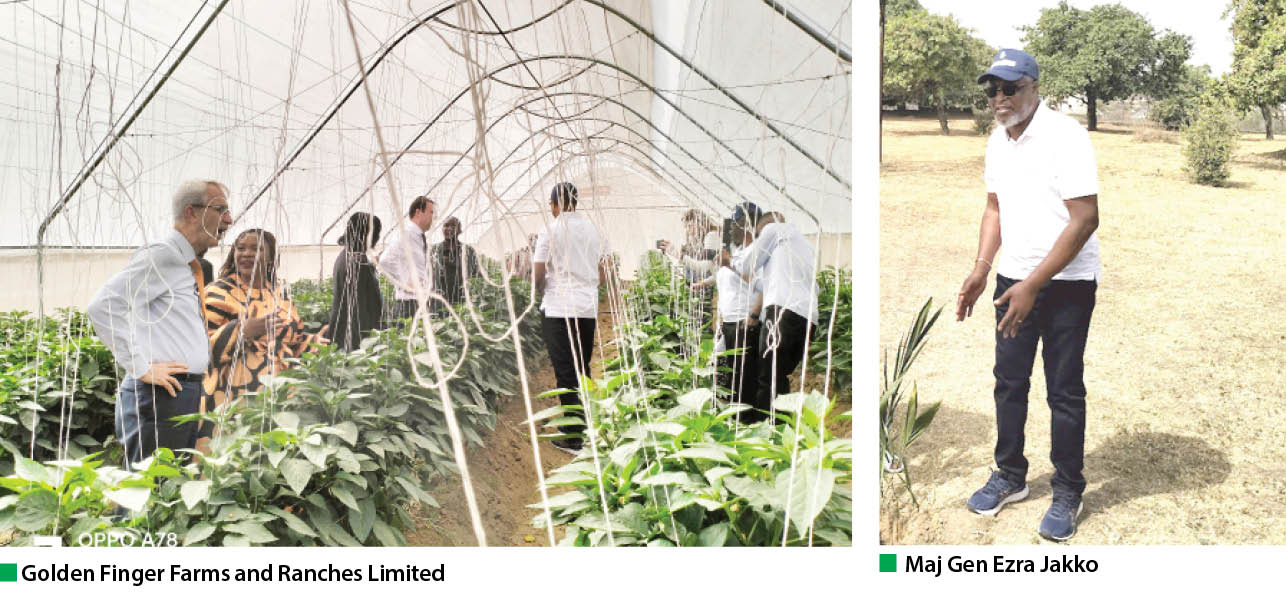Driven by innovations and technology, Golden Finger Farms and Ranches Limited is one of the farms that attract youths and other stakeholders in and around Abuja.
Established by Major-General Ezra J. Jakko (retd), the curtain-edge farm is now also a training ground for the IITA youth in agribusiness project in collaboration with the Kingdom of the Netherlands.
In an exclusive interview with Daily Trust on Sunday in the farm, the retired military general explained how the idea to set up the farm came to him, his motivation, the journey so far and the dream for the future.
“I believe my motivation comes from my background – from my parents. My parents were great farmers and I saw what they did on the farms. However, we also believe that the world has changed a lot and we believe we can improve on our traditional system or types of farming or agriculture.
- Maulid: Shettima urges leaders to renew commitment to service
- N/Assembly sectoral debates ventilate Tinubu’s budget 2024, But…
“I believe the way my parents practised is no more sustainable for this generation, especially if we are talking about bringing youths into agriculture.
“What we are trying to do in Golden Finger Farms and Ranches Limited is to incorporate modern techniques of farming. Why not totally do away with our traditional systems?”
His decision to develop a hybrid farm and engage in a fully integrated agricultural system with a stake in various crops, cattle and greenhouse horticulture was prompted by this question.
The farm in Abuja has 65 highly automated greenhouses for producing vegetables, and there are additional greenhouses in the South West farm. Also, the farm assisted in the establishment of five completely operational green houses for other farmers who have faith in them.
Livestock on the farm include cattle, camels, ostriches, rabbits and other animals. It has a poultry farm with more than 50,000 birds (layers and broilers) for eggs and meat.
According to General Jakko, the machinery for the hatchery and meat processing is also ready to be installed in the upcoming months.
Speaking on this year’s expansion objectives and the equipment already on the ground, General Jakko said, “We are going to do a meat processing or an automated abattoir,” pointing to a 40-foot container with equipment for processing of cows, adding, “You can process 25 in a day. So we are starting like small, but that will be a fully automated abattoir.
“We also have chicken processing line equipment that will allow you to process your chicken. We will also have a fully automated poultry hatchery.
“And, of course, you are aware that our poultry farms are completely automated in every way imaginable. We are going to start hatching, so we will do everything hundred per cent.
“We also have a veterinary clinic here because farmers call us for intervention here and there, so we decided to have a veterinary clinic, vet drugs and supplies.”
He said plans were underway to also kick-start the production of its own livestock feeds because of the current challenges many farms face.
“Of course, we are going into production of our own feeds because it’s no more sustainable to buy from big companies because they are also challenged,” the farmer said.
In addition to growing vegetables in greenhouses, the farm grows various crops on hundreds of hectares across several states, including maize, soybeans, rice and beans.
“We have an orchard farm in Gora for our various fruits. Then in the South West, where we have our farm base, our target in the South West is actually to have functional plantations, like have a cashew and cocoa plantations.
“We are also experimenting on a coffee plantation. Next, we are working on a palm plantation. Thus, in the South West, that is our primary goal,” he said.
The farm does not currently have trouble selling its produce – eggs or livestock – because everything is sold at the farm gate. However, the farmer said the farm’s ultimate goal was to construct a warehouse – a sort of retail system where it would be able to combine fresh meat and produce with dried commodities like corn and other things. “You know that would be quite modern,” the retired military officer said.
Asked if the issue of security is a challenge, he said, “Yes, it is a significant obstacle. I believe that the way we handle security is by just including the community in whatever we do. We gave them the impression that this place was their own when we first arrived, and that their parents, kids and other family members could all work here in whatever capacity. That has, in my opinion, been beneficial to us. We have only really had one or two small incidents – perhaps someone broke in and stole some crops. That’s fortunately all we have encountered, but it doesn’t go beyond that. And I believe collaborating with the community has benefitted us.”
In regard to financial accessibility, he described how he overcame its obstacles.
“We approach finance in an incremental manner because we have been in this business for a long time, starting with the greenhouse. It wasn’t 20 or 50 at first. We began with 10 and increased it to 20, and so on as resources became available. Of course, we also had assistance from friends and relatives who wanted to invest or help, but so far, so good, we only took what we could chew. We only bite off what we can chew on,” he said.

 Join Daily Trust WhatsApp Community For Quick Access To News and Happenings Around You.
Join Daily Trust WhatsApp Community For Quick Access To News and Happenings Around You.


